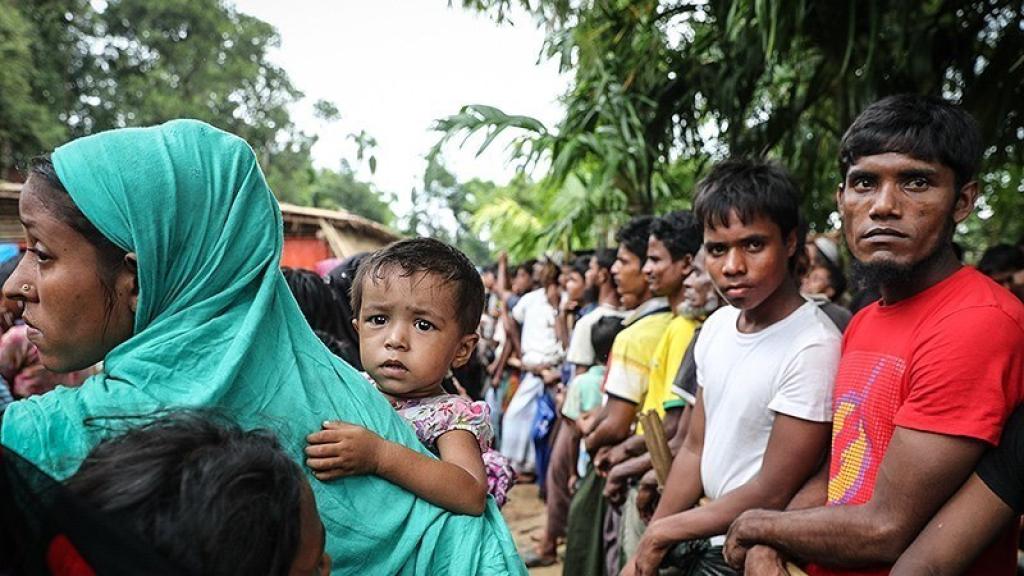The Rohingya crisis and the national question: A Marxist perspective

The plight of the Rohingya people is one of the most pressing humanitarian crises today. As an ethnic and religious minority in Myanmar, the Rohingya have faced systematic discrimination, state violence and forced displacement. Our statelessness is a product of Myanmar’s exclusionary nation-building process, rooted in colonial legacies and post-independence power struggles.
From a Marxist perspective, it is helpful to analyse the Rohingya crisis through the lens of Vladimir Lenin’s work on “the national question” . By doing this we can examine how oppressed nationalities and ethnic groups fit within the broader struggle against capitalism and imperialism.
The historical context of Rohingya oppression
The Rohingya are a predominantly Muslim ethnic group from Myanmar’s Rakhine State. Even with historical records confirming our presence in the region for centuries, the Myanmar government refuses to recognise us as citizens. The 1982 Citizenship Law institutionalised our exclusion by denying us legal recognition, making us stateless and depriving us of fundamental rights such as freedom of movement, education and employment.
This exclusion is deeply tied to Myanmar’s post-colonial nation building process. Since independence from Britain in 1948, Myanmar’s military and political elites, dominated by the Bamar ethnic majority, have promoted a rigid national identity based on Buddhist nationalism. This framework positioned the Rohingya as an “internal other” and facilitated their systematic persecution. Mass violence escalated in 2017, when a brutal military crackdown, justified as a response to alleged insurgent attacks, forced over 700,000 Rohingya to flee to Bangladesh.
The national question and Rohingya statelessness
In Marxist thought, “the national question” concerns the relationship between oppressed nationalities and the broader struggle against capitalism and imperialism. Lenin argued that national self-determination was essential for socialist movements but warned against nationalism being used to divide the working class.
The Rohingya crisis exemplifies this dynamic, where ethnic identity is manipulated to serve the interests of Myanmar’s ruling class.
i. Ethnic exclusion as a tool for elite power
The exclusion of the Rohingya serves Myanmar’s ruling class by diverting class struggle into ethnic divisions. The military junta and nationalist elites use anti-Rohingya sentiment to consolidate power, deflecting attention from broader economic injustices and working-class struggles. By positioning the Rohingya as a “foreign threat,” the state advances unity among the Bamar majority while suppressing broader dissent.
ii. The role of global capitalism and imperialism
The Rohingya crisis is not just a national issue, it is entangled with global capitalist interests. Myanmar’s military, despite international condemnations, benefits from arms deals and economic investments from regional and global powers. China and India, for instance, maintain economic partnerships with Myanmar’s government, driven by their strategic interests in natural resources and trade routes.
Similarly, Bangladesh, which hosts nearly a million Rohingya refugees in Cox’s Bazar, faces economic and political pressures that global powers exploit. The influx of refugees places enormous strain on Bangladesh’s resources, creating dependency on international aid. Organisations like the United Nations High Commissioner for Refugees and the World Bank provide humanitarian assistance, but such aid is often tied to broader geopolitical interests, reinforcing Bangladesh’s position in the global economic hierarchy.
Rohingya refugees in Cox’s Bazar: A crisis within a crisis
Cox’s Bazar, the world’s largest refugee settlement, houses nearly one million Rohingya refugees in overcrowded, under-resourced camps. While Bangladesh initially provided refuge, conditions have deteriorated due to resource constraints, political tensions, and international neglect.
- Precarious living conditions: Rohingya refugees face food shortages, inadequate healthcare, and lack of employment opportunities (note: lack of fire safety measures and natural disaster safety awareness have led to several incidents where fires have broken out in the camp)
- Security concerns: Armed groups and human traffickers exploit the desperate conditions in the camps. Threats to youth are increasing, as is the violence against Rohingya people in the camp, with some Rohingya even being murdered.
- Political and economic pressures: The Bangladeshi government, facing domestic opposition, has increasingly restricted Rohingya mobility and access to education. It has even stopped cars from entering the camp, preventing long-term integration.
The crisis in Cox’s Bazar illustrates how refugees become pawns in capitalist politics within Bangladesh as much as pawns of global capitalist politics. Wealthy nations refuse to resettle significant numbers of Rohingya, while regional powers such as China and India focus on their own strategic interests rather than addressing the root causes of the crisis.
A call for solidarity and resistance
From a Marxist perspective, the Rohingya crisis is not merely an ethnic or humanitarian issue — it is deeply tied to state oppression, capitalism and imperialism. The ruling elites in Myanmar exploit ethnic nationalism to maintain power, while global capitalist forces benefit from instability and aid politics.
To resolve the crisis, solutions must go beyond humanitarian aid and address the structural forces driving Rohingya exclusion. This includes:
- Challenging the Myanmar military’s grip on power and exposing its ties to global capitalism.
- Advocating for Rohingya self-determination and ensuring we are recognised as equal members of society. By championing Rohingya self-determination, the workers’ movement inside Myanmar can undermine Buddhist nationalism within the working class.
- Building solidarity between oppressed groups in Myanmar, Bangladesh and beyond, and linking the Rohingya struggle to broader anti-capitalist movements.
Ultimately, the Rohingya crisis is a stark reminder that ethnic oppression is inseparable from class struggle. A just resolution requires dismantling the structures of ethnic nationalism, state oppression and global capitalist exploitation that sustain their marginalisation.